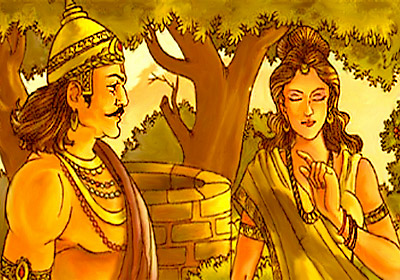 King Yayati was a great scholar of Vedas who had five brothers. They are Yati, Samyati, Ayati, Viyati and Kriti. Devayani and Sharmishtha were his two wives. Devayani was the daughter of Guru Shukracharya. Sharmishtha was the daughter of Demon King Vrishparva. Sage Shukracharya cursed Yayati to old age but later allowed him to exchange it with his son, Puru. This story has been mentioned in Adi Parva of Mahabharata as well as Bhagavata Purana. Yayati ruled from Hastinapur.
King Yayati was a great scholar of Vedas who had five brothers. They are Yati, Samyati, Ayati, Viyati and Kriti. Devayani and Sharmishtha were his two wives. Devayani was the daughter of Guru Shukracharya. Sharmishtha was the daughter of Demon King Vrishparva. Sage Shukracharya cursed Yayati to old age but later allowed him to exchange it with his son, Puru. This story has been mentioned in Adi Parva of Mahabharata as well as Bhagavata Purana. Yayati ruled from Hastinapur.
Yayati was the second son King Nahusha who belonged to the Aila dynasty, son of Ayu, the eldest son of Pururavas and Prabha, the daughter of Svarbhanu. Yayati succeeded his father.
Legend of King Yayati
Devayani was daughter of Guru Shukracharya. She had been cursed by sage Kacha that she would not be able to marry another Brahmana. Shukaracharya was living in his palace of Vrushaparva, whose daughter Sharmishta was a close friend of Devayani.
One day as Devayani and Sharmishtha were enjoying themselves in a park, King Yayati passed by. Devayani secretly loved Yayati as he had once rescued her from a dry well. Devayani and Sharmishtha introduced themselves to him and Devayani confessed to her love and asked him to marry her.
Shukracharya agreed to his daughter`s request. He gave Sharmishtha in dowry. He warned Yayati that he should never let Sharmishtha share his bed. Sharmishtha lived in Ashok Vatika. One day Yayati passed by Ashok Vatika. Sharmishtha confessed her love with the king and wanted him to marry her. Both of got married secretly. They hid this fact from Devyani.
Yayati had two sons from Devyani : Yadu and Turvasu and had three sons: Druhyu, Anu and Puru. When Devyani came to know about the relationship she felt betrayed. Devayani went back to her father`s house. Shukracharya was displeased and cursed that he would lose his youth and become an old man. Yayati became an old man. If Yayati wanted he could give his old age to someone and take his youth from him. Yayati was confident that his sons would exchange their youth with him. Yayati requested all his five sons one by one to give their youth to him. Except Puru everyone rejected his demand. Puru became the successor of king Yayati later on. Yayati realized the futility of his actions and renounced the world and did immense penance. He attained salvation and won great admiration.









